by Michael | Oct 3, 2016 | Blog
Things do go wrong. Even at weddings. Even when you’ve done everything possible It’s just the nature of the thing. Everything may not run smoothly. S**t happens, as they say.
So what can you do about it?
When something goes wrong (through negligence), you may want to sue. I’m a civil celebrant, and not competent to comment in this area, so I’ll leave it to you to consult an expert, if you can’t resolve your issue amicably.
Of course, prevention is the best cure. If you start your planning early, and are diligent in your choices, you reduce the chances of catastrophe considerably.
The areas most likely to cause problems are:
Dresses; videos; photos; venues; flowers; rings; cars; make-up; catering; suits.
Suppliers
When choosing your suppliers, it pays to go by recommendation. However, this is not always available. You can look and see if there are complaints against your supplier. Search their name plus “complaints” on Google and see what comes up. It might be instructive.
Their fan page on Facebook may also tell you something. As may Twitter.
Otherwise, a meeting may help to reassure you (sometimes gut feelings are very helpful). Ask plenty of questions and watch out for any answers that don’t feel right.
Questions
When dealing with your suppliers, make sure you ask them:
- if they can guarantee delivery of your product on the desired day and time (or in a reasonable time-frame)
- if they can guarantee the product will be fit for its agreed use
- what back-up arrangements are there (and what are their terms for refunds?)
- what their full contact numbers are (e-mail, phone and emergency phone), especially for the big day
- what the payment and delivery terms actually are
It is wise to check terms and conditions before you pay the deposit. Go through these carefully (or get a well-disposed and intelligent friend to do this for you!).
Your Civil Celebrant
Although many UK Civil Celebrants may belong to an association that regulates their conduct (such as the Association of Independent Celebrants or the UK Society of Celebrants), there is currently no obligation to do so. In exceptional cases, they may not even have been trained (properly).
If you can’t get first-hand referrals or locate independent reviews, have a look at their website. There may be video evidence of their competence. Social media may help you get a picture of them. A face-to-face chat, a Skype conversation or, failing that, a phone call is a wonderful idea, because you will then get a feel for their personality. You need to trust your celebrant and have the sense that you will get on well with them.
As a civil celebrant, I believe in working professionally throughout (and with humour, when appropriate!).
Once I receive a deposit (usually £100) and your signed booking form, your date is secure and I start work shortly after. I always consult you, so that your needs are understood and met.
I aim to respond in reasonable time to enquiries etc., deal appropriately with any complaints – which I hope will never happen! – and work efficiently and effectively so that any ceremony I prepare meets (or exceeds) my client’s expectations. I aim to arrive on the day an hour before the scheduled start time, and promise to conduct any ceremony to the best of my ability.
Your side of the bargain
You have responsibilities to the supplier too.
- Make sure you pay your deposit and/or balance on time
- Respond to e-mails/calls in a timely manner
- Don’t leave it to the last minute to make demands or changes
- You have a share in ensuring that your relationship is a civil and pleasant one
If you are careful and start planning early, you can significantly reduce the risk of things going wrong – perhaps, not quite to zero, but very low. And you can also be pleased with yourself that you have done all that you can.
Good luck with it all!
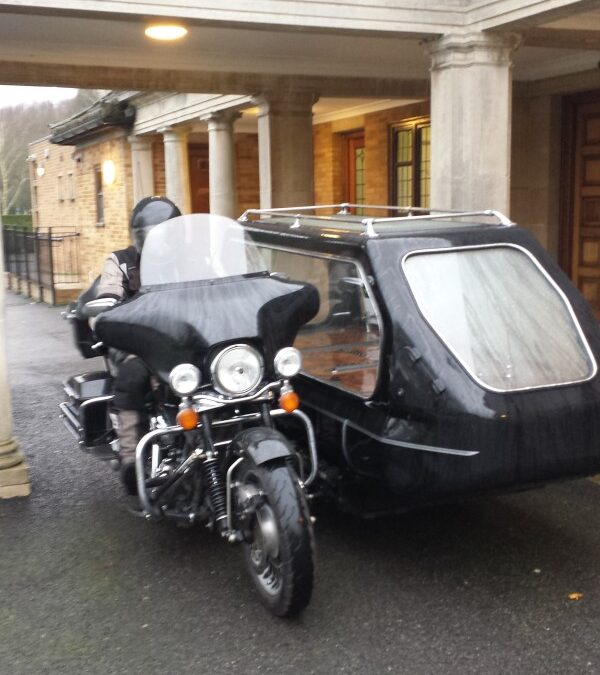
by Michael | Sep 27, 2016 | Blog
Recently, I wrote about crucial decisions that affected wedding planning. I’d now like to look at life-or-death decisions.
By that I mean decisions relating to death.
It’s an understatement, but when someone dies, it can be an extremely difficult time for those left behind. Obviously, just as relationships differ, so will reactions. Many people will be experiencing emotions such as shock, anger, grief or confusion. It is at just such a time, when they’re at their lowest ebb, that they are expected to deal with the funeral (and, potentially, probate or a contested will, etc).
First Steps
In most cases, help is available. The GP or hospital doctor who signs the death certificate will normally direct you to your next port of call. This is often the Town Hall, where there is more paperwork waiting for you before the death can be registered.
Some Councils (have a look on Google) offer a package that covers everything in one place, and that can make things much easier.
Funeral Directors can normally give advice and guidance.
Funeral
Registering the death is a legal obligation. A lot of people may be surprised to learn that a funeral is not.
Most people will choose to have a funeral. This may be through choice,or because it’s ‘the done thing’. It may well be in order to achieve closure via a ceremony. You can actually – subject to certain legal regulations – bury your loved one in your garden, if you so choose. The point is that you don’t need to have anything done beyond disposing lawfully of the body. This may certainly save on Funeral Director fees, which can be really quite high.
Questions
Nonetheless, most will go with a funeral. Of course, you have to decide on a burial (standard or woodland?) or a cremation. The deceased may have left instructions. You may have strong feelings.
How big and grand do you want the funeral to be? What about the wake?
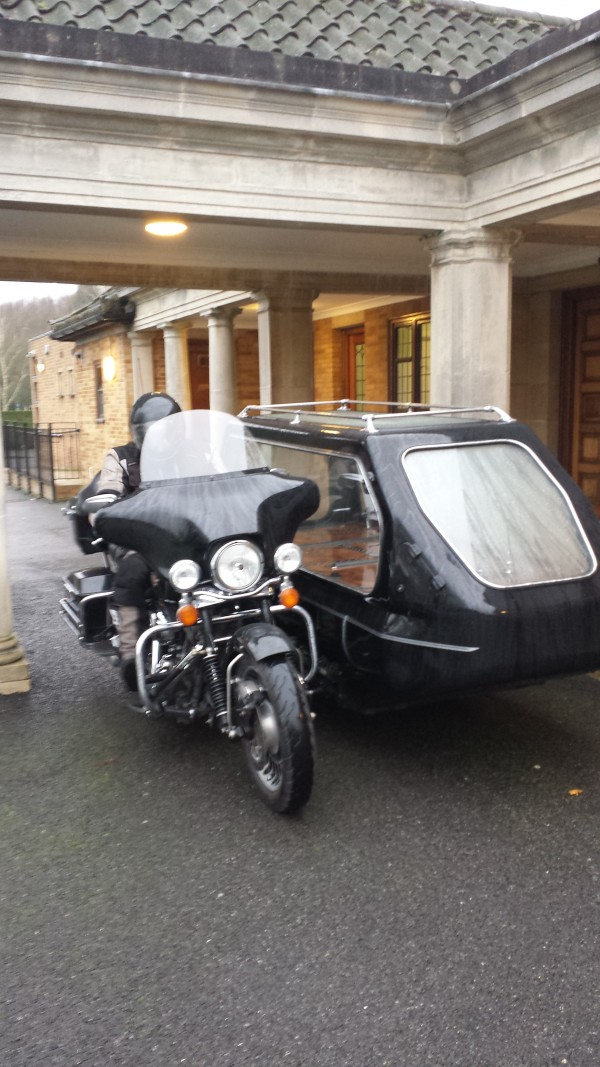
Fully, partly or not religious?
Another fallacy is that the funeral has to be fully religious. Or else, humanist.
What if the deceased totally rejected religion? What if the surviving family does? What if the deceased was agnostic? What if the family is of mixed religious faiths? In such cases, there is real scope for a civil celebrant.
A civil celebrant will visit the family and discuss the possibilities. They will be able to advise and offer suggestions. They will usually aim to make the service a celebration of life (although it will probably include serious and affecting readings and moments). The service will be tailored to your exact requirements and wishes.
Lots of issues to consider, but, as I’ve suggested, help is at hand.
I acknowledge that this article only scratches the surface of the life-or-death decisions, but I hope it raises questions that you may be glad you have faced.

by Michael | Sep 20, 2016 | Blog
When you’re preparing for a major life-cycle event, there are crucial decisions to be made. It doesn’t matter whether it’s a wedding, vow renewal, naming ceremony or even a funeral; you’re going to want to get it right.
Getting it right will depend on your choices as well as your budget. This is a mighty subject, so I propose to limit myself to weddings today.
Crucial decisions will, of course, vary from couple to couple. For some, flowers will be absolutely essential as a component of the wedding; others may see them as a desirable extra. People will normally want photographers/videographers, and these need to be chosen carefully (see my blog on this).
The most important decisions will surely revolve around the ceremony and the reception.
Ceremony
Will you have a full religious wedding in a religious building? The ceremony may well include the legal bits, which can be handy. But logistically, you’ll have to consider how you – and the guests – get from the church (or whatever) to the reception.
What if you don’t want a full religious service? Or even a part-religious one?
There are options, such as using a civil celebrant like myself. I can conduct a unique, tailor-made ceremony for a couple, with as much or as little religion or ritual etc. as they want. They will still need to have been legally married by the registrars beforehand (either at the Register Office or immediately before, at the same premises as the bespoke ceremony).
You may need to consider also how formal you want the ceremony to be, how many participants to involve (ushers, bridesmaids, Best Man/Woman etc.), the music, the decorations and so on. Do you plan to write your own vows?

Venue
Go and visit a number of possible venues, once you’ve had a look at their websites. There’s no substitute for getting a feel for the place (your gut feeling is so important here). You will also want to come equipped with a list of questions. If the event planner isn’t very helpful, does it make much sense to choose that venue?
Reception
Depending on what you want and can afford, you will have to look at who you invite and what sort of seating plan you go with. Are you having a sit-down meal or a buffet? Will there be canapés etc? When choosing a caterer, do ask to sample some of what they can offer.
Will there be gaps in the proceedings that might need an entertainer? Or a toastmaster? Will you want a disco? Might you provide a quiet area? What about children?
Have you thought about speeches?
Useful help
As you will have seen from this overview, there are many, many issues to address. A professional wedding planner will ease you through this (at a cost, of course). If you start early enough, the issues should not overwhelm you, but maybe I can offer you some welcome help?
I have written a book on this very subject: “Your Wedding Guide”. For less than £5, you can buy it on Amazon at: http://amzn.to/2e9RcqS
Alternatively, if you contact me with your e-mail address, I shall be delighted to e-mail you my free Wedding Countdown Checklist, which will suggest important tasks you need to do and time-frames for completing them.
I look forward to being of service to you!
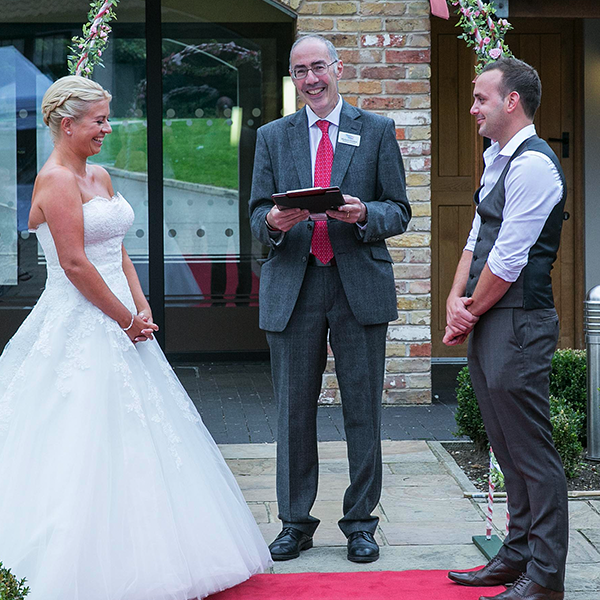
by Michael | Sep 15, 2016 | Blog
People don’t really clock what a civil celebrant can do for them. It’s inexplicable to them.
Celebrants have been practising for well over 15 years in this country. Numbers are growing. There are now a variety of umbrella organisations (like the AOIC) , who do their best to publicise and support the profession.
Nonetheless, the majority of people have no idea, or, at best, only half an idea, how we might be able to benefit them.
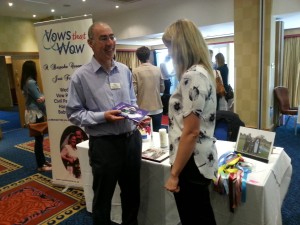
One of the best ways to spread the word is through face-to-face meetings. I regularly display at wedding fairs and even business shows. I don’t normally get any direct business, but I sow some seeds and, at least, educate people that there is a choice out there.
Better still, I show people the benefits when I get invited to conduct ceremonies. They are often amazed that my ceremony actually wasn’t as bad as they had expected. In fact, it might even have been rather good!
Another useful step is to publish testimonials from satisfied customers. This often reveals the service I can offer better than my words can! After all, the customer knows what they were expecting and wanting. They can evaluate and appreciate how it was achieved.
Here’s a brilliant example from a wedding I conducted (at quite short notice) just last week:
“Michael conducted an absolutely incredible wedding ceremony for us. I have since lost count of the number of guests who have commented on how good he was and what a fantastic service he delivered. Many asked whether he was in fact a close friend of the family, because of the warmth and delivery of the service. Ahead of the ceremony we had several Skype calls to go through everything which worked really well. He even read out a welcome in both Swedish and German, for family who’d travelled from abroad. Above all he gave us total confidence in his attention to detail and great suggestions, that he’d be conducting the service the way that we had wanted it to be. It was extremely special and personal and the way he delivered it was perfect with just the right balance of formal (we couldn’t hold back the tears) and uplifting (where everyone was laughing out loud). We couldn’t recommend him more highly.”
My belief is that, by reading something like that, you will get a better idea of how I can make your ceremony special rather than through any other method. (Do you agree?)
Be that as it may, I sincerely hope that you may be prepared to share this article and help to spread the word. A civil ceremony is not for everyone, but there are so many people who could benefit from a celebrant’s services (if only they knew they existed).
To sum up, celebrants offer true and free choice.
Maybe that’s not so inexplicable, after all!
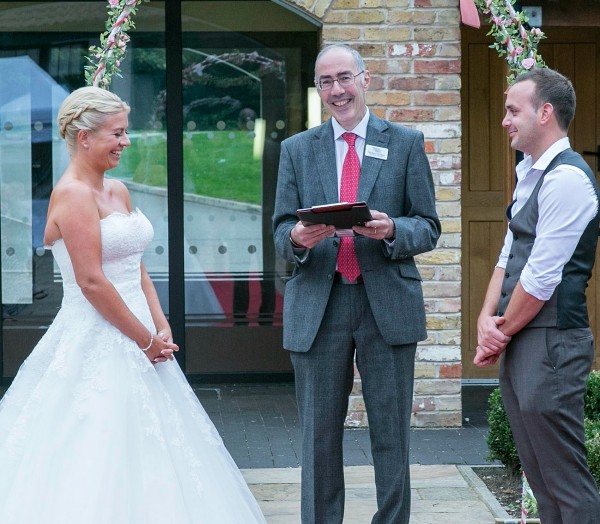
by Michael | Sep 13, 2016 | Blog
I consider myself so lucky that I am doing a job I absolutely love. (Maybe “paradise” is a wee bit strong, though!)
Bonuses
As a civil celebrant, I am privileged to be taken into the confidence of people. Obviously, these are often people I might never even have met otherwise. They talk openly to me. Sometimes I learn things close members of the family or friends don’t know. I spend time with them and work closely with many. They are often fascinating and lovely people (although no two visits are ever the same!). And, of course, I am there at the front with them on the big day, facilitating their event and supporting them.
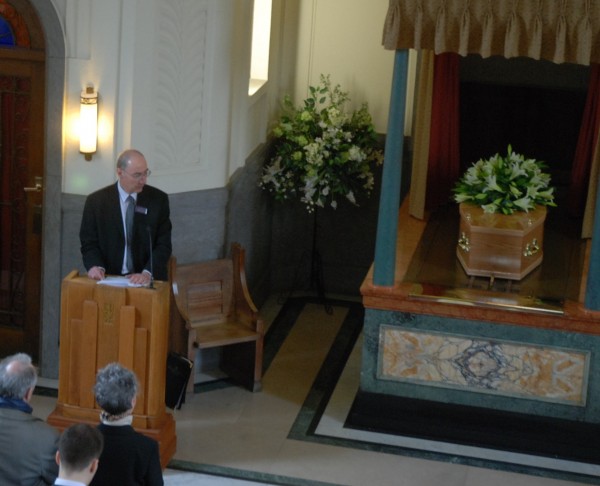
It may surprise you that I bracket funerals and weddings (and other joyful occasions) together. However, in my work there are distinct similarities between them. I may have over a year to prepare a wedding (although I have been given as little as a few weeks!) A funeral normally has about a week’s incubation time.
In both cases, I need to visit/Skype the relevant people, ask the necessary questions, listen to them and their needs, send them drafts for approval, and create the ceremony that reflects their personalities and beliefs. But the time-frame is different.
Down side
There aren’t too many things I dislike about what I do, which is wonderful. However, I have refused two possible pieces of work.
In the first case, I was invited to quote for a naturist wedding. Since I believe in being as relaxed as possible on the day, as a priority is to put my clients at their ease, I felt it unwise to pursue this. Even as a professional public speaker, I think I might have felt too self-conscious!
Secondly, I was on an introductory Skype call with a certain Ashleigh in Essex. She was very sure what she wanted for her wedding. That’s fine – I am happy to share ideas and advice, but I am not offended if people go with a different vision. However, after a while I noticed a man in the background. I wondered if he could be the groom. Indeed, he was.
“Why don’t you invite Steve to join the call?” I asked.
This is what Ashleigh replied: “He’s having nothing to do with the wedding. He’ll just turn up on the day and do what I tell him to!”
I didn’t feel that there was much of a future working with Ashleigh!
My biggest regret
I do have a couple of regrets.
I missed out on a wedding between a delightful mixed-faith couple because one parent ruled that if the celebrant wasn’t ordained (which I am not), then she would boycott the wedding. (Sorry, whose wedding was it?!)
At one of my funerals, a particularly requested hymn was not played. Why not? Because the technician popped out briefly, and totally and utterly missed his cue! It something you can’t legislate for, but I felt we had let the family down.
I’ve always fancied a destination wedding ceremony. At last, I had an offer to conduct a (re-arranged) wedding in Ibiza. Sod’s Law prevailed because it now clashed with the only holiday I had booked for our family all year. I had to say “no”.
Achievement
What am I proud of?
Bringing joy, for one thing.
I’d like to think that my website testimonials page speaks eloquently. But at several funerals, I have been pleased to be told, “I don’t know if I should be saying this, but I really enjoyed it.”
I’m proud of serving people.
On one occasion, a daughter didn’t want a funeral for her, shall we say, “difficult” father. I suggested that she should do as she felt fit. I implied that it might be worth going through with it. She wouldn’t be able to turn back the clock later, if she regretted having opposed it now. In the event, she agreed to it and was able to release much emotion. Her gratitude afterwards was very moving and also satisfying.
Oh, I do have one more regret: I only wish I had found out sooner about my path to paradise!







